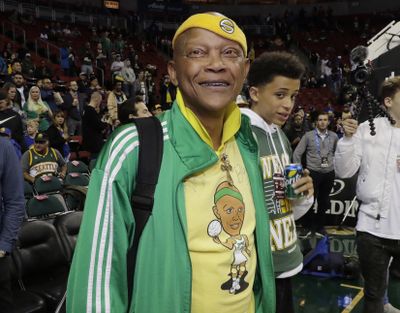Sending positive thoughts to Sonics great Slick Watts, who has ‘long road to recovery’ after stroke

With all due respect to Jay Buhner and Gary Payton, it might well be the most famous dome in Seattle sports history – beautifully bald, long before it was fashionable. And he owns an instantly recognizable nickname that is sheer perfection in describing both his look and his game.
But Donald Earl “Slick” Watts is far more than a catchy moniker and a shiny pate, the latter invariably outfitted with a headband that, as described long ago by a New York Times columnist, “makes him look like the planet Saturn in sneakers.”
No, somewhere along the line Slick Watts became a Seattle institution and beloved citizen. And now, the undersized man (by basketball standards, anyway) with the oversized heart, who never turned down a chance to help others, needs all our good thoughts. And, if you’re so inclined, our prayers.
Watts’ son, Donald Watts – another foundational basketball man in Seattle – put out the sobering news on social media Monday evening. Slick, who is three months from his 70th birthday, suffered what Donald termed “a major stroke” Friday.
He wrote that Slick “is in stable condition on a long road to recovery … We are big believers in the power of prayer & positivity … We ask you to send positive vibes not only to Slick but to all who are suffering.”
Donald asked for privacy “to navigate this as a family as we learn what the future will look like.”
That wish will be respected. Consider this a refresher course on what Slick Watts represents to Seattle.
He was one of our first breakout pro sports stars, joining the still-fledgling Sonics in 1973 after going undrafted out of college at Xavier. Not the Xavier you’re thinking of, but Xavier of New Orleans, the tiny NAIA school Watts attended out of his even tinier hometown of Rolling Fork, Mississippi.
The Sonics’ head man, Bill Russell, gave him a tryout mainly as a favor to Bob Hopkins, Watts’ college coach and Russell’s cousin. Slick made the team, although Russell told The Associated Press in 1976, “I don’t really know why I kept him.”
Watts mainly rode the bench at first but slowly impressed the NBA legend when he did get on the court. His playing time steadily increased, and by the time the 1974-75 playoffs rolled around, Slick was a starter.
The next season, Watts was a mainstay, a defensive whiz and playmaker extraordinaire. He became the first player to lead the NBA in steals and assists in the same season. More than that, though, Slick was a presence, endearing himself to fans not just with his energetic play but his friendly, charismatic personality.
It was the bald head and the headband that initially attracted attention. But it was Slick’s accessibility and electric smile that drew them back. As a child, a football injury had caused Watts’ hair to grow in patches, leading to a despised nickname, “Map Head.”
Watts told The Seattle Times in 2017 that, at the time, he felt like a freak. It was why Watts shaved his head – which, in turn, prompted the nickname that lives on. According to Slick’s son, Donald, it also helped develop a compassion and empathy that came to define him.
“I study development, trauma, how things affect people because that’s what we do,” Donald told The Times. “I definitely think it has a lasting impact on the heart he shows for people and that need he has to be connected with people. He definitely had a time in his life when he went to sleep every night and felt like, ‘Why me?’ He overcame that, but there’s still an echo to those traumas.”
In that 1976 AP article, written when Watts was 24, he explained why he signed every autograph, and worked so hard to connect with fans.
Sign up for Fan Fix
Your dose of local sports news. Delivered Monday through Friday.
“I remember what it was like when I was on the outside,” he said. “When I was young, it was my dream just to talk to pros. When someone like Jerry West would say, ‘Go home and practice,’ I’d stay up all night shooting baskets and dribbling.
“I’m in that position now, so when they reach out, I accept.”
It’s startling to look up Watts’ stats and see how fleeting his career was. Shortly after Lenny Wilkens took over as coach from Hopkins (who had replaced Russell in 1977-78), Wilkens determined the Sonics were a better team with Dennis Johnson and Gus Williams in the backcourt. It was hard to argue, considering they went to the NBA Finals that year and won it all the following season.
But Slick wasn’t around to see it. He was traded to New Orleans midway through the ’77-78 season and played the following year for Houston. And then just like that, at age 27, Watts was out of the NBA.
Those 4½ seasons in Seattle, however, were more than enough for him to work his way into countless hearts. A reporter from Sport magazine who profiled Watts late in his career wrote, “He’s the most popular athlete in the history of the state. He’s the most famous unknown who ever lived.”
Watts would never again be unknown. And though he traded in the trappings of fame for a meaningful second life as a teacher and coach, his fame has lived on, too. So has the community spirit that led to Watts winning the NBA’s J. Walter Kennedy Citizenship Award in 1976.
And now Slick, who never met a person he didn’t consider a new friend, faces a long, tough road. Let’s send positive vibes cascading in his direction.